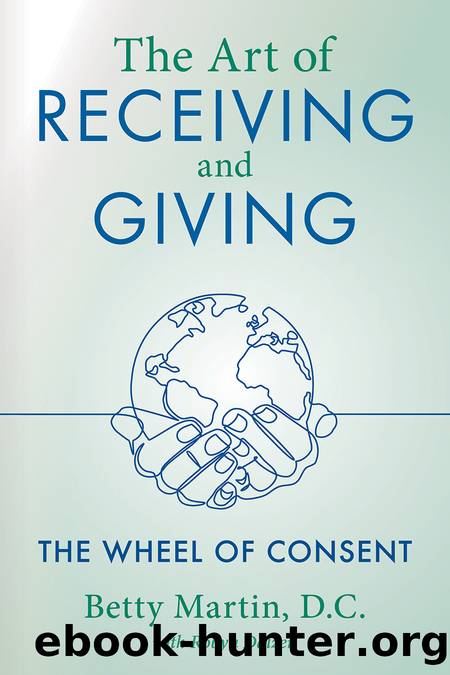The Art of Receiving and Giving by Betty Martin

Author:Betty Martin
Language: eng
Format: epub
Tags: Nonfiction > Psychology > Human Sexuality
Nonfiction > Self-Help > Personal Growth > General
Publisher: Betty Martin
Published: 2021-02-01T23:35:33+00:00
Chapter 13
Lab 3: Play
If its purpose is more important than the act of doing it,
itâs probably not play.
âDr. Stuart Brown
Back in my chiropractic days, I attended a seminar on using chiropractic with animals. The presenter asked, âHow can you tell if an animal is healthy?â The answer: âIt plays.â I thought, Well, then we humans are in trouble! Play is a fundamental human need to do something for enjoyment with curiosity and no need for a result. This need is something we are born with. We seem to outgrow the ability to play, but the need for play we never outgrow, and most of us have to learn it all over again.
In this lab, I talk about what play has to do with the quadrants and a few skills it takes to recover it. Then Iâll introduce an experiment.
The elements of play
The key elements of play are that 1) something changes, 2) you respond to the change, and 3) you are open to the outcome.
Change. An example is puppies playing in the yard. One puppy changes direction, and the other responds. One rolls over, and the other responds. The change is moment by moment, and each change invites another change. The changes may be fast, slow, or anywhere in between. Even in a slow-moving game like chess, you have to wait for something to respond to.
Responding to change. Thatâs where it gets fun. When puppy A turns south, puppy B follows. He doesnât keep going and wonder why his technique didnât work. Within limits, the more change there is, the more play is possible. Not enough change, and it gets boring; too much change too fast, and it gets scary.
Responding means improvising; it arises from somewhere within, and we donât always know where. Itâs easier to improvise when you know what the constraints are. In sports, there are the constraints of the playing field and rules of the game. Within those constraints, you improvise moment by moment.
Open to outcome. It has to be an open-ended outcome, or itâs work. Trying to make something happen is not play; itâs outcome management. The more determined you are to get the result, the more tension you feel. Sadly, this is how many people experience sex.
Itâs possible to have a goal that is part of your play, like a neighborhood soccer match, but soccer pros are not playing; they are working. Itâs also possible to enjoy your work by bringing some element of curiosity and play into it. Otherwise itâs drudgery. Play requires a certain kind of curiosity. Letâs see what happens ifâ¦
Play is satisfying as it is. There is no need for an outcome.
A few more things about play. Play depends on both (or all) people choosing to engage. Otherwise, itâs imposition or assault. If you are wanting to play and the other is stuck on a script, itâs going to get frustrating pretty quickly. Play requires that people engage in a way that does not harm themselves or the other and nourishes them in some way.
Download
This site does not store any files on its server. We only index and link to content provided by other sites. Please contact the content providers to delete copyright contents if any and email us, we'll remove relevant links or contents immediately.
Four Thousand Weeks by Oliver Burkeman(1840)
What Happened to You? by Oprah Winfrey(1764)
Karma by Sadhguru(1605)
This Changes Everything by Unknown(1500)
You Are a Badass: How to Stop Doubting Your Greatness and Start Living an Awesome Life by Jen Sincero(1175)
Don't Sweat the Small Stuff...and It's All Small Stuff by Richard Carlson(1115)
Infinite Circle by Bernie Glassman(1047)
How to Do the Work by Dr. Nicole LePera(1005)
Let's Talk About Hard Things by Anna Sale(986)
Declutter Your Mind: A step by step guide to learn to control your thoughts, stop worrying, relieve anxiety and eliminate panic attacks and negative thinking by Mia Chandler(964)
Who Moved My Cheese? by Spencer Johnson(949)
The 4-Hour Workweek by Timothy Ferris(948)
Real Strength: Build Your Resilience and Bounce Back From Anything by Psychologies Magazine(939)
The Path of Greatness--The Game of Life and How to Play It and Other Essential Works by Florence Scovel Shinn(916)
Breakup Bootcamp by Amy Chan(892)
Be Your Best Self by Mike Bayer(887)
Curative Magic by Rachel Patterson(877)
The Book of Hope by Jane Goodall(867)
Advice for Working Moms (HBR Working Parents Series) by unknow(861)
